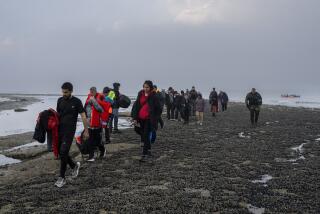Europe’s Uprooted Residents Seek Help
- Share via
BARCELONA, Spain — In his nightmares, one young Moroccan is swallowed by a fish. A woman from Ecuador cries nonstop, her voice reduced to a whisper. A Pakistani man suffers stomach pains so sharp that he feels as if he is being stabbed.
They are all illegal immigrants, far from their native lands and often alone as they struggle to support spouses and children back home.
Their physical and psychological pain is so intense that psychiatrists in Spain consider it a new disorder, calling it “Ulysses syndrome” after the wandering ancient Greek.
These doctors and colleagues from six other European countries -- Belgium, Britain, France, Italy, the Netherlands and Portugal -- went before the European Parliament in November to share their experiences in treating victims and plead for financial help for treatment of immigrants.
Spain, long a land that people moved away from, is seeing a reverse tide. With an official population of 40 million, it is home to 1.6 million legal immigrants -- a threefold increase in eight years -- and more than 1 million others are thought to be here without residence or work papers.
Many immigrants barely scrape by, doing farm work or other menial jobs that Spaniards shun.
For some, their trauma begins with harrowing journeys to Spain, often organized by criminal traffickers. Travel companions die en route. Children cling to the undersides of trucks ferried across the Strait of Gibraltar from North Africa. Pregnant women attempt the perilous crossing in small, overcrowded boats.
“We have dubbed it the Ulysses syndrome because the odyssey immigrants describe reminded us of the Greek hero of the Mediterranean Sea,” said psychiatrist Joseba Achotegui, a pioneer among Barcelona physicians who have been monitoring immigrants’ emotional woes since the late 1990s.
“The post-immigration environment can have a significant impact on mental heath,” said Dr. Charles Watter of the University of Kent in England, who has studied the mental health of asylum-seekers.
Achotegui says Ulysses syndrome is characterized by sadness, insomnia, bodily aches and disorientation. The symptoms vary as much as immigrants’ histories and countries of origin. Some immigrants feel separation and isolation anxiety. Others are terrorized by their ordeals.
More than 1,000 immigrants have received help from a program started by Achotegui in 1994, the Psychological and Psychosocial Service for Immigrants and Refugees. Many are women, particularly educated ones.
One patient is a Russian musician who identifies himself only as Mourat, 39. He left his poor town in the Caucasus mountains two years ago to seek a better life for the wife and 6-year-old daughter he left behind.
“I had to leave; I was out of work and I wanted a future for my family,” Mourat said.
But things went wrong. As an illegal immigrant in Barcelona, he was living in a cramped apartment and was ripped off by gangs. He paid large sums of money for identity papers that never materialized.
Mourat became so depressed that he couldn’t sleep. He had no energy or appetite. He had high blood pressure and terrible stomach and chest pain as he mourned his separation from his wife and daughter.
But since he started seeing Achotegui, Mourat says, his spirits have lifted. He’s giving piano lessons and directs a small choir.
“I’ve learned how to talk and share my emotions, to think positively each morning I wake up,” he said.
Achotegui says Ulysses syndrome patients don’t become suicidal, but obsess about making ends meet for themselves and the family left behind. He recalls a Latin American woman telling him, “How can I think of killing myself when I have two children waiting for me?”
The tales heard in the two-story San Pere hospital in Ciutat Vella, Barcelona’s most crowded immigrant district, are poignant.
Mohamed, 24, a Moroccan, has recurrent nightmares of being swallowed by a fish. Last year, he crossed the Strait of Gibraltar at night in an open and crowded rubber boat. Today, he lives in misery, with no work, identity papers or hope.
Rashid, a Pakistani, says regular doctors couldn’t explain the horrific pain in his stomach. “I feel as if I’ve been stabbed,” he said. At San Pere, psychiatrists determined that he was suffering from anxiety after four years without work in Barcelona.
Both men refuse to give their last names for fear of being identified and expelled.
Achotegui, who also teaches at the University of Barcelona, says many patients need lengthy sessions of therapy and medication. He urges fellow physicians to be aware of the illness.
“It is our duty to show this new, cross-cultural phenomenon,” he said.
More to Read
Sign up for Essential California
The most important California stories and recommendations in your inbox every morning.
You may occasionally receive promotional content from the Los Angeles Times.












